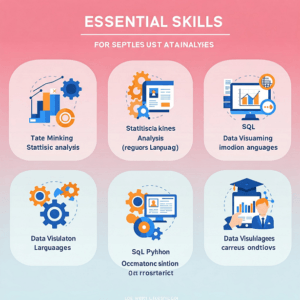Decoding the Data Analyst Skillset: A Comprehensive Guide
The world of data is exploding, and with it, the demand for skilled data analysts. If you’re considering a career in this exciting field, you’re in the right place. This article will break down the essential data analyst skills required, answering your burning questions and providing a roadmap to success.

What Skills Do You Need for a Data Analyst?
A data analyst acts as a bridge between raw data and actionable insights. They transform complex datasets into clear, understandable narratives that drive business decisions. This requires a blend of technical and soft skills.
Hard Skills: The Technical Toolkit
- SQL (Structured Query Language): Absolutely! Is SQL required for data analysts? The answer is a resounding yes. SQL is the cornerstone of data manipulation and retrieval from relational databases. It’s essential for querying, filtering, and aggregating data. Mastering SQL is a non-negotiable for most data analyst roles. Check out resources like W3Schools SQL Tutorial to get started.
- Data Visualization: Being able to present data effectively is crucial. Tools like Tableau, Power BI, and even basic Excel charting are vital for creating compelling visualizations that communicate findings clearly.
- Statistical Analysis: A solid understanding of statistical concepts like hypothesis testing, regression analysis, and distributions is necessary for drawing meaningful conclusions from data.
- Programming Languages (Optional but Highly Recommended): While not always mandatory, proficiency in languages like Python or R can significantly enhance your analytical capabilities. These languages offer powerful libraries for data manipulation, statistical modeling, and machine learning.
- Data Cleaning and Preprocessing: Raw data is often messy and incomplete. Data analysts must be skilled at identifying and rectifying data quality issues, ensuring accuracy and consistency in their analysis.
- Data Warehousing and ETL (Extract, Transform, Load): Understanding how data is stored and moved within an organization is beneficial. Knowledge of ETL processes can help you efficiently access and prepare data for analysis.
Soft Skills: The Human Element
- Communication: Being able to explain complex data insights to both technical and non-technical audiences is paramount. Strong communication skills are essential for collaborating with stakeholders and influencing decision-making.
- Problem-Solving: Data analysis is inherently about solving problems. You need to be able to identify business challenges, formulate hypotheses, and use data to find solutions.
- Critical Thinking: Data analysts must be able to evaluate information objectively, identify biases, and draw logical conclusions.
- Attention to Detail: Accuracy is crucial in data analysis. A keen eye for detail ensures that your analysis is reliable and trustworthy.
- Business Acumen: Understanding the business context is essential for framing your analysis and providing relevant insights.
Is Data Analyst a Hard Skill?
Data analysis is a combination of both hard and soft skills. While the technical skills (SQL, statistics, etc.) are often considered hard skills, the soft skills (communication, problem-solving) are equally important for success.
What are Top 3 Skills for a Data Quality Officer?
While related, a Data Quality Officer focuses specifically on ensuring data integrity. Their top 3 skills would be:
- Data Governance: Understanding data quality frameworks and regulations.
- Data Profiling and Assessment: Identifying data quality issues and their root causes.
- Data Quality Tools and Technologies: Proficiency in software used for data cleansing, validation, and monitoring.
Skills Required for Data Analyst Fresher:
Entry-level data analyst roles typically require a foundation in the core skills mentioned above. Focus on developing strong SQL skills, data visualization abilities, and a basic understanding of statistical concepts. Relevant coursework, projects, or internships can significantly boost your resume. Check out our page on Data Analyst Fresher Jobs for more information.
Data Analyst Salary:
Data analyst salary varies based on location, experience, and industry. Resources like Glassdoor and Indeed can provide insights into current salary trends. You can also explore Data Analyst Salary in India on our website.
Data Analyst Skills Checklist:
- [ ] SQL
- [ ] Data Visualization (Tableau, Power BI, Excel)
- [ ] Statistical Analysis
- [ ] Programming (Python, R – Optional)
- [ ] Data Cleaning and Preprocessing
- [ ] Communication
- [ ] Problem-Solving
- [ ] Critical Thinking
Data Analyst Course:
Numerous online and offline courses can help you develop the necessary skills. Platforms like Coursera, Udacity, and edX offer excellent data analysis programs. Consider exploring our Data Analyst Course (Internal Link) tailored to your needs. We also offer Data Analyst Training (Internal Link) programs.
Skills Required for Data Analyst Internship:
Internships provide valuable hands-on experience. Focus on demonstrating your eagerness to learn and apply your skills. Even basic SQL knowledge and a passion for data can make you a strong candidate. Find out more about Data Analyst Internships (Internal Link) on our site.
Soft Skills for Data Analyst:
- Communication
- Problem-solving
- Critical Thinking
- Collaboration
- Adaptability
By developing a strong foundation in both technical and soft skills, you can position yourself for a successful career in the dynamic field of data analysis. Remember to continuously learn and adapt to the evolving landscape of data tools and techniques. Explore our Data Analyst Jobs page to find current openings.

Business Analyst , Functional Consultant, Provide Training on Business Analysis and SDLC Methodologies.

“I appreciate the detailed explanation, very helpful!”
I have read several good stuff here. Certainly value bookmarking for revisiting. I surprise how a lot attempt you place to create such a magnificent informative site.